罗经国《新编英国文学选读》(第4版)教材-第7章 18世纪(1688~1798)【圣才出品】
罗经国《新编英国文学选读》(第4版)教材-第8章浪漫主义时期(1798~1832)【圣才出品】

罗经国《新编英国⽂学选读》(第4版)教材-第8章浪漫主义时期(1798~1832)【圣才出品】第8章浪漫主义时期(1798~1832)8.1 复习笔记Ⅰ. Historical Background(历史背景)(1) The American and French Revolutions(美国⾰命和法国⾰命)Under the influence of the American and French revolutions, national liberation movements and democratic movements swept across many European countries. England was no exception.在美国⾰命和法国⾰命的影响下,民族解放运动和民主运动席卷整个欧洲。
英国也不例外。
(2) The Industrial Revolution(⼯业⾰命)It brought great wealth to the rich and worsened working and living conditions of the poor. With the invention of new machines, many skilled workers were replaced by women and children and working hours for young children lasted fourteen to sixteen hours a day.⼯业⾰命使富⼈更富,穷⼈更穷。
随着新的⽣产机器的发明,妇⼥和⼉童渐渐取代了熟练的⼯⼈,为了⽣存,他们每天必须⼯作⼗四到⼗六个⼩时。
Ⅱ. Intellectual Background(学术背景)(1)Rousseau (1712~1778)(卢梭)He is generally regarded as the father of romanticism, and he rejects theworship of reason. He believes that in the really vital problems of life it is much safer to rely on feelings, to follow our instincts and emotions. He preaches that civilized men sho uld “return to nature”, to a primitive state of life.卢梭是浪漫主义之⽗,他反对崇拜理性,他认为对待⽣活中很多⾄关重要的问题最好是靠感觉、直觉、情感,。
罗经国《新编英国文学选读》(第4版)教材-第4章 15世纪(1400~1550)【圣才出品】

第4章15世纪(1400~1550)4.1 复习笔记Ⅰ. Historical background(历史背景)(1) The Hundred Years’ War(百年战争)The Hundred Years’War continued and in 1415 at the Battle of Agincourt King Henry Ⅴ (1413~1422) defeated the French army and claimed himself the heir to the French throne.百年战争还在持续,在1415年的阿金库尔战役中,亨利5世(1413~1422)战胜了法国军队,并宣布自己是法国的继承者。
(2) The War of the Roses (1455~1485)(玫瑰战争)The War of the Roses, or the Thirty Years’ War, was a series of civil wars fought between the two great families, both of which claimed the right to the English throne. It lasted for thirty years until King Henry Ⅶ defeated Richard Ⅲ(1483~1485) at the Battle of Bosworth and ended the civil war.玫瑰战争,又叫三十年战争,是发生在两个家族之间的一系列内战,他们都宣称自己有权统治英国。
它持续了30年,直到亨利7世在博斯沃思战争(1483~1485)中打败理查德3世,内战宣告结束。
(3) The discovery of America and the new sea routes(美洲大陆和新航海线路的发现)In 1492, a Genoese mariner, Christopher Columbus (ca.1436~1506) who believed that he could reach India by sailing west, landed in America with thesupport of the Spanish sovereigns Ferdinand and Isabella.1492年,热那亚水手克里斯托弗·哥伦布相信只要一直向西航行就能到达印度,在费迪南和伊莎贝拉的支持下,他登上了美洲大陆。
新编英国文学选读(上)chapter7
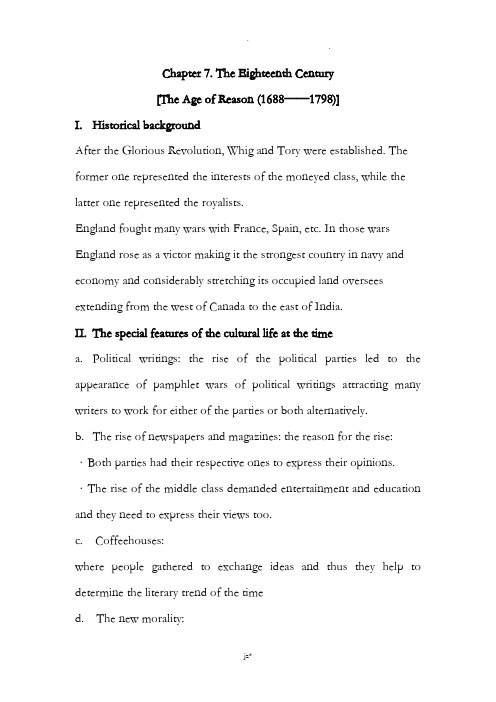
Chapter 7. The Eighteenth Century[The Age of Reason (1688——1798)]I. Historical backgroundAfter the Glorious Revolution, Whig and Tory were established. The former one represented the interests of the moneyed class, while the latter one represented the royalists.England fought many wars with France, Spain, etc. In those wars England rose as a victor making it the strongest country in navy and economy and considerably stretching its occupied land oversees extending from the west of Canada to the east of India.II. The special features of the cultural life at the timea. Political writings: the rise of the political parties led to the appearance of pamphlet wars of political writings attracting many writers to work for either of the parties or both alternatively.b. The rise of newspapers and magazines: the reason for the rise: ·Both parties had their respective ones to express their opinions. ·The rise of the middle class demanded entertainment and education and they need to express their views too.c. Coffeehouses:where people gathered to exchange ideas and thus they help to determine the literary trend of the timed. The new morality:·The emphasis on reason·The development of tolerance of different opinions in politics and religione. The influence of science and technology:·Principia Mathematica in 1687 by Newton (1642——1727)·The new epistemology of John Locke (1632——1704)f. French influence——Augustanism——neoclassicism stressing to learn from the classicals*What is classicism"The characteristics in Greek and Roman classical works. They are clarity, logic, form, proportion, balance with each other, parallelism, restraint.III. The characteristics of neoclassicism1.Reason rather than emotion and form rather than content were emphasized.2.Most of the writings at the time were didactic and satirical.3.The closed couplet was the only possible verse form for serious work for elegance, correctness, appropriateness and restraint were preferred.4.It is exclusively a "town〞poetry, catering to the interests of the "society〞in great cities. The humbler aspect of life are neglected and it showed in most part no love of nature, landscape, or country things and peoplecking romantic elements and being hostile to medieval literature6.An age of prose, especially the latter part the centuryIV. Representative authors of the time1. Daniel Defoe2. Jonathan Swift3. Joseph Addison4. Alexander Pope5. Samuel Johnson6. Henry Fieldding7. Thomas Gray8. Thobias George Smollet9. Richard Brinsley Sheridan10. Robert Burns11. William Blake1.Daniel Defoe(1661—1731)a pioneer novelist of England and also a prolific writer of books and pamphlets on a great variety of subjects.1)his life story:a.from a dissenter’s family: Presbyterian butcherb.having a questionable character in politics, but strong belief in religious freedom2)his literary achievements:·fiction:Robinson , Crusoe , Moll Flanders·contribution to journalism & regulating English trade methods and principles3) characteristics of his fiction:a.Robinson Crusoe:(1)based on real experience of a Scottish sailor but bined with his own imagination, it is still a fictional work.(2)using the picaresque frame with a story in the shape of a journal and having strong sense of journalistic truth; containing serious wisdom of life(3)The importance of the hero:i. typical of the rising English bourgeois class, practical and diligent with a restless curiosity to know more about the world and a desire to prove individual power in the face of social and natural challengesIi. a real hero of middle class different from the hero of knights or epic hero(4)moral teaching: sing praise of labour, presenting it as the source of human pride and happiness as well as a means to change man’s living conditions from desperation to prosperity(5)limitations:i. praise colonization overseas through the relationship with Fridayii. his attitude to woman is open to criticismiii. Praise slaveryb. Moll Flanders:(1) its story(2)the significance, one is for the first a woman being the protagonist; artistically more mature than Robinson: better structure and better plot; so it is written in an autobiographical form called a memoir2. Jonathan Swift(1667-1745)a churchman and also a university graduate who viewed human society with contempt and has been called a cynic and even a misanthrope. 1)his life story:His father died before he was born, and he had to accept the aid of his relatives and finished his study at Dublin University.2)his literary achievements:a.satirical essays:The Battle of Books(1696-1698), A Tale of the Tub(1696-1698)b.Writings in pamphlets:The Draiper’s Letters, A Modest Proposac.fiction:Gulliver’s Travel(1726)3)characteristics of his pamphlets:·Gulliver’s Travela. criticizing the oppression and exploitation of the Irish people by the absentee landlords and the English government.b. using bitter satire·The battle of Booksa debate happening 18th century. Some people modern people ·The Tale of the Tuba satire on various religious sects: Catholic, Anglican and dissenters’churches: changes done by different churches to the Christian doctrines·The Draiper’s Lettersrevealing the corruption and license, debased·A Modest Proposala satire on the English government’s heavy exploitation4)A Modest Proposala.It is a bitter satire on the policy of the English government towards the Irish people.b.Swift in this article suggested to the Irish people that the best way to end their misery was to produce children and sell them at market as a delicious dish for the rich.3. Joseph Addison(1672-1719)and Richard Steele(1672-1729)1) their life stories: they were born in the same year, attended the same school and later studied at the same university.they had the samepolitical trend——whig2) their literary achievements:Joseph Addison & Richard Steele·Joseph Addisonstarted the periodical essays that were the most characteristic genre of 18thcentury literature.·Richard Steelecontribution to the periodicals:The Tatler, The Spectator, The Guardian3)characteristics of their periodical essays:a.Methods:d, indirect, was admirably adapted to their purpose.2. were full of wit, humor, and satire.b. Themes:dealt with1)light topics-fashions, head-dresses, practical jokes,2)polite conversations, discussed art, philosophy, drama, and poetry, and sought in so doing not only to interest the general reader in such subjects, but also to guide and develop their tastes.3) deeper topics such immoralityOne other characteristic: draw some images of some typical middle class people:C. Style: simple language familiar to the middle men; graceful, poised, well balanced, familiar words and expressions to the readers,4)Aims of their writing:a.to educate the newly risen middle class.b.to bridge the gap between the small circle of London elegance and wit,and the large, serious, rather Puritan middle class.5)two selected pieces written by Addisona. The Royal Exchangeb. Sir Roger at Church4.Alexander Pope(1688-1744)1) his life story:·he was self-educated.·he worked hard against poor health and unfavorable conditions and gained a profound knowledge of both the classics and the craft of writing.2)his literary achievements:·An Essay on Criticism, The Rape of the Lock, An Essay on Man ·Contribution to poetry in heroic couplets3)characteristics of his poems:a. succeeded Chaucer and Dryden in bringing metrical form to its perfection.b. contained a great number of quotable lines that have passed intoeveryday speech as popular sayings, such as :"To err is human, to forgive divine〞, and "For fools rush in where angels fear to tread.〞c. limitation: Pope is never profound in thought, so the poems lack original ideas5.Samuel Johnson(1709-1784)the greatest English man of letters between Pope and Wordsworth. 1) his life story:·he was born in a book seller’s family.·he was conservative in his world outlook and was against any kind of reform or innovation.·he upheld tradition and authority. Uphold conventions authority 2)his literary achievements:·A Dictionary of the English Language·Contribution to a periodical, The Rambler,·Known for essay; his Preface to his edition of Shakespeare and The Lives of the Poets3)characteristics of his writing:Emphasizing the specification of language6. Henry Fielding(1707-1754)playwright, novelist and district law magistrate, came from an aristocratic background1) his life story:·was born to an upper-class family·began writing plays while at university and took it as his profession after leaving school.2)his literary achievements:novels:The History of the Adventures of Joseph Andrews,The History of Tom Jones3)characteristics of his novels:a. The History of the Adventures of Joseph Andrew( 1) its story and significance(2)in his preface to this novel Fielding proudly announced that he had created a new genre called ic epics in prose and discussed its characteristic feature.(3)the novel turned from a novel of seduction into one of the first exemplars of the great English panoramic tradition, which was to reach new heights later in Thackeray and Dickens.b. The History of Tom Jones(1) its story(2) Its significance:a. the understanding of allegory in the storyb. to Fielding, the countryside represents the basic goodness of human race, whereas the city stands for evil and sin.Tobias George SmollettA general introductionTobias George Smollett (19 March 1721 –17 September 1771) was a Scottish poet and author.He was best known for his picaresque novels, such as·The Adventures of Roderick Random (1748),·The Adventures of Peregrine Pickle(1751), which influenced later novelists such as Charles Dickens.·His last novel, the best novel is The Expedition of Humphry Clinker (1771), published in the year of his death.7. Thomas Gray(1716-1771)one of the representative poets at the time1) his life story:was born in London and educated at Eton and Cambridge, where he, after a grand tour on the continent, spent the rest of his life.2)characteristics of his poems:·more natural and spontaneous in thought·emphasizing emotions and sentiments3)The Elegy Written in a Country Churchyard8. Richard Brinsley Sheridan (1751-1816)1) his life story:was born in Dublin, of Irish origin, and was educated at Harrow.2)his literary achievements:drama: The Rivals, A Trip to Sarborough, The School for Scandal3)The School for Scandala. its story and significanceb. it is written in the tradition of edy of Manners, and exposes the immorality, hypocrisy, money-hunting, and scandal-mongering of the idle classes in 18th century England.9. Robert Burns(1759-1796)1) his life story:was born in Scotland in a poor peasant family and educated himself through selfstudy.2)his literary achievements:poems and songs3)characteristics of his poems and songsa.written in the Scottish dialect and in the tradition of Scottish folk songs.b.besides love lyrics, most of his poems and songs are about patriotic and political themes.10. William Blake (1757-1827)a poet as well as an engraver.1)his life story:was born in a hosier’s family in London and drew pictures andengraved to illustrate his works and the works of others.2)his literary achievements:·poems:Poetical Sketches, Songs of Innocence,Songs of Experience, Prophetic Books·broke with the neo-classical tradition both in form and in content3)characteristics of his poemsa. Songs of Innocence(1) expressed the poet’s delight in life,even in the face of sorrow and suffering.(2)the world is seen through the eyes of a child’s imagination which can be attained by adults if they cast away the follies and deceits of the hostile world and seek a visionary world through their imagination.b. Songs of Experience(1) the atmosphere is no longer sunny but sad and gloomy, and evil is found everywhere in this world.(2) through the loss of imagination, man has bee a slave to the falsehood and hypocrisy of religion and society, and thus has lost the Heaven of Innocence and gained the Hell of Experience.c. the contradiction of these two poem collections。
罗经国《新编英国文学选读》(第4版)-章节题库-第5章 英国文艺复兴(1550~1642)【圣才出品
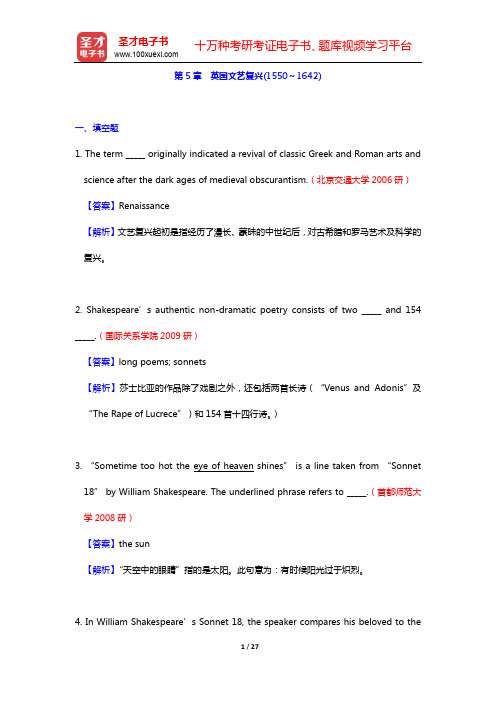
第5章英国文艺复兴(1550~1642)一、填空题1. The term _____ originally indicated a revival of classic Greek and Roman arts and science after the dark ages of medieval obscurantism.(北京交通大学2006研)【答案】Renaissance【解析】文艺复兴起初是指经历了漫长、蒙昧的中世纪后,对古希腊和罗马艺术及科学的复兴。
2. Shakespeare’s authentic non-dramatic poetry consists of two _____ and 154 _____.(国际关系学院2009研)【答案】long poems; sonnets【解析】莎士比亚的作品除了戏剧之外,还包括两首长诗(“Venus and Adonis”及“The Rape of Lucrece”)和154首十四行诗。
)3. “Sometime too hot the eye of heaven shines” is a line taken from “Sonnet 18” by William Shakespeare. The underlined phrase refers to _____.(首都师范大学2008研)【答案】the sun【解析】“天空中的眼睛”指的是太阳。
此句意为:有时候阳光过于炽烈。
4. In William Shakespeare’s Sonnet 18, the speaker compares his beloved to thesummer season, and in the last two lines (“So long as men can breathe or eyes can see/So long lives this, and this gives life to thee”), written in a rhymed _____, he states that his beloved will live in eternity through “this”, which refers to _____.(天津外国语大学2011研)【答案】heroic couplet, poem【解析】诗句为莎士比亚十四行诗第18首的最后两句。
罗经国《新编英国文学选读》(第4版)教材-第3章 乔叟时期(1350~1400)【圣才出品】
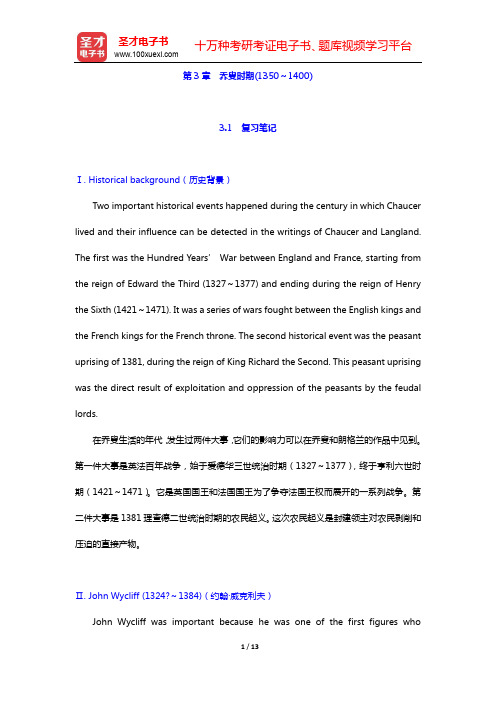
第3章乔叟时期(1350~1400)3.1 复习笔记Ⅰ. Historical background(历史背景)Two important historical events happened during the century in which Chaucer lived and their influence can be detected in the writings of Chaucer and Langland. The first was the Hundred Years’ War between England and France, starting from the reign of Edward the Third (1327~1377) and ending during the reign of Henry the Sixth (1421~1471). It was a series of wars fought between the English kings and the French kings for the French throne. The second historical event was the peasant uprising of 1381, during the reign of King Richard the Second. This peasant uprising was the direct result of exploitation and oppression of the peasants by the feudal lords.在乔叟生活的年代,发生过两件大事,它们的影响力可以在乔叟和朗格兰的作品中见到。
第一件大事是英法百年战争,始于爱德华三世统治时期(1327~1377),终于亨利六世时期(1421~1471)。
罗经国版《新编英国文学选读》笔记
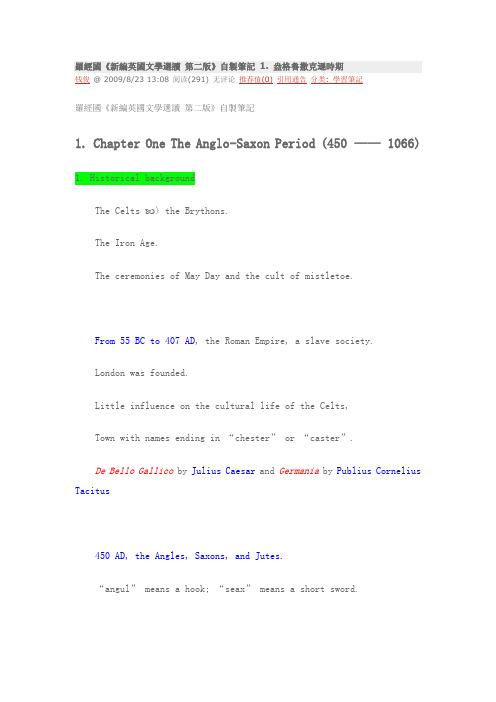
羅經國《新編英國文學選讀第二版》自製筆記1. 盎格魯撒克遜時期钱俊@ 2009/8/23 13:08 阅读(291) 无评论推荐值(0)引用通告分类: 學習筆記羅經國《新編英國文學選讀第二版》自製筆記1. Chapter One The Anglo-Saxon Period (450 —— 1066) 1. Historical backgroundThe Celts 〉the Brythons.The Iron Age.The ceremonies of May Day and the cult of mistletoe.From 55 BC to 407 AD, the Roman Empire, a slave society.London was founded.Little influence on the cultural life of the Celts,Town with names ending in “chester” or “caster”.De Bello Gallico by Julius Caesar and Germania by Publius Cornelius Tacitus450 AD, the Angles, Saxons, and Jutes.“angul” means a hook; “seax” means a short sword.Around 500 AD, the Celtic King Arthur fought against Cerdic, the founder of the kingdom of Wessex. Camelot, King Arthur’s capital.Later 8th, the Danes, or the Vikings.King Alfred the Great of Wessex (849-899)Harold, the last Saxon King 〉William the Duke of Normandy.597, Pope Gregory the Great sent St. Augustine to England and the first converted king was King Ethelbert of Kent.2. Northumbrian School and Wessex literature——two highlights in the development of the Anglo-Saxon literature.Monasteries and abbeys in the kingdom of Northumbria.Caedmon in the 7th turned the stories in the Bible into verse form ——Paraphrase. Inspired by God.The Venerable Bede (673-735), wrote in Latin The Ecclesiastical History of the English People from Caesar to 731. It was Bede who told about the story of Caedmon.The reign of King Alfred (871-899)First, Latin books into West Saxon dialect. It is said that King Alfred translated the history of Bede.Second, the launching of The Anglo-Saxon Chronicle, from Caesar’s conquest to 1154.Third, created a style of Anglo-Saxon prose which was not obscure.3. Anglo-Saxon poetryThe earliest is Widsith and the last is Maldon.BeowulfAs early as the 6th in oral formWritten down in the 8th.The manuscript preserved dates back to the 10th and in Wessex dialect.One datable fact in the poem is a raid on the Franks by Gelac in 520.3183 lines.Danish King Hrothgar built a hall called Heorot.Grendel for 12 years.Beowulf, nephew to King Hygelac of the Geats. With 14 companions.Hrothgar's friend Aeschere killed by Grendel's mother.Killing Grendel’s mother with a magic sword in the cave.One of the 12 companions, Wiglaf, helped Beowulf kill the dragon.Physical strength demonstrates his high spiritual qualities.A mixture of paganism and Christian elements.Old English Poetry:1. The technical structure:1)Every line consists of two clearly separated half lines betweenwhich is a caesura. The two parts of the line are united byalliteration, a form of initial rhyme, which is the repetition of the same sound or sounds at the beginning of two or more words that are next to or close to each other.2)Every half line consists of two feet and each foot is made up ofan accented syllable and a varying number of unaccented syllables.3)Generally there are 3 alliterations per line, two in the first halfline and one on the first foot of the second half line.2. The scop also used a figurative language called “kenning”, a metaphor usually composed of two words, which becomes the formula of a special object: “helmet bearer” for “warrior.”3. The use of repetition and variation. Same idea expressed more than once by synonyms.2. Chapter Two The Norman Period (1066-1350)1. Historical background1066, the battle of HastingsThe Normans, also descendants of Scandinavian marauders, having seized a wide part of northern France.Accelerated the feudalism in England.Large tracts of land by the king, barons, knights and the church.A peasant uprising in 1381.2. Middle EnglishFor 3 centuries after the Norman conquest, two languages were used side by side in England: Latin and French.Words and expressions from Latin and French and Greek in the 14th.Inflectional forms dropped and grammar simplified.3. Religious literatureThe issue of personal salvation.Moral and spiritual responsibilities of individual rather than his ethical and social responsibilities.Conventional theme: homiletic paraphrases of the Gospels4. Romance and the influence of French literatureThrough French literature the introduction of Italian literature.Chief breeding ground was the aristocratic society in France in the 12th and early 13th and was introduced into England in the second half of the 13th and the 14th.In subject matters, romance naturally falls under three categories.1) The matter of France: the exploits of Charlemagne the Great and Roland,a national hero in the 8th, Chanson de Roland.2) The matter of Rome: Alexander the Great and the siege of Troy.3) The matter of Britain: the Arthurian legend, Sir Gawain, Launcelot, Merlin, the Holy Grail, the death of King Arthur.Sir Gawain and the Green KnightWritten about 1375-1400.About 2500 lines.Four “fyttes”.Green ChapelFirst day, a deer; second day, a boar; the third day a fox. A girdle. —〉the Order of GarterA true knight should not only dedicate himself to the church but also should possess the virtues of great courage, of fidelity to his promise, and of physical chastity and purity.It contained several element which prepared for a new culture.A vivid portrayal of the hero and a fine analysis of his psychology.A well unified and exciting plot full of climaxes and surprises.The three hunting scenes and the three bedchamber scenes are closely related with each other.A mixture of Anglo-Saxon poetry, the musical effect of which depends on the alliterated initial syllables and French poetry, the musical effect of which depends on the fixed number of accented and unaccented syllables in a verse line. Paragraphs of long alliterative lines of varying length are followed by a single line of two syllables, called “the bob”, and a group of four-stressed lines called “the wheel”, i.e., a set of short lines forming the concluding part of a stanza.3. Chapter Three The Age of Chaucer (1350-1400) Historical backgroundChaucer and William Langland (1330?-1400?) and the writer of Sir Gawain were contemporaries.But he deserves a period of his own.Two historical events which their influence can be detected in the writings of Chaucer and Langland: The Hundred Years’ War from the reign of Edward III (1327-1377) to the reign of Henry VI (1421-1471), or from 1337-1453; the peasant uprising of 1381, the reign of King Richard II.The Hundred Years’ War for the French throne.The first seven English kings were in fact living in France.Starting from King Henry III, England became the principal concern of the English kings.An awakening of national consciousness in England. No longer vassals to the French but claimed that they had the right to succeed the French throne. And the French language was gradually replaced by the native tongue.Peasant uprising. John Ball: “When Adam delved and Eve span / Who was then the gentlemen?”From Kent to London under the leadership of Wat Tyler.William Langland and another writer John Wycliff (1324?-1384) expressed people’s hatred for the church and the government.John Wycliff (1324?-1384)One of the first figures who demanded to reform the church.Translated the Bible into standard English. Fixed a national standard for English prose to replace various dialects. Father of English prose.Many pamphlets in Latin to attack the feudal lords and the church. Opposed to the claim of the Pope to the English throne. Civil authority had the right to deprive the church of the property if it proved unworthy of people’s trust. The views were taken over by the peasants in their uprising.William Langland (1330?-1400?)Piers Plowman, or The Vision of Piers Plowman, another alliterative poem besides Sir Gawain and the Green Knight. Giving a realistic picture of the 14th century England.The form of allegory, a story or description in which the characters and events symbolize some deeper underlying meaning, and serve to spread moral teaching. An allegory has a double meaning. A primary or surface meaning, and a secondary meaning, or underlying meaning. In an allegory, abstract qualities or ideas, such as patience, purity or truth, are personified as characters in the story.The visions the poet had on a May morning.A high tower ——TruthA deep dungeon ——the Father of FalsenessPeople from all walks of life, laymen and religious people.Gluttony.Lady Meed (bribery) to be married to Falseness but protested by Theology. The king proposed to marry her to Conscience but failed. Meed is expelled and Conscience and Reason become king’s counsellers.Conscience preaching to the people and Repentance moving their hearts, including the Seven Deadly Sins.People came to seek for truth but no one knows the way. Then Piers Plowman appears. This episode suggests that man should do the task that falls to his lot.Geoffrey Chaucer (ca. 1340-1400)Born in a wine merchant family with rising fortunes.Grew up in London.1357, a page at court.1359, joined the army in the Hundred Year’s War and was taken prisoner. 1360, returned to England and married a maid of honour of the queen. For the next ten years in the Continent on diplomatic missions.1382, Controller of Customs at the port of London.1386, PM from KentJohn of Gaunt(Duke of Lancaster. 1340-1399. English soldier. The fourth son of Edward III, he ruled England during his father's last years and in the beginning of Richard II's reign.) as his patron.〉A great variety of occupations and experiences as well as close observation of life made him familiar with the lives of various classes. Died on Oct 25, 1400, the Poet’s Corner in WestminsterAbbey.Works divided into 3 periods, corresponding to the 3 periods of his life.(1) 1360-1372, wrote under the influence of the French literature, even translated French poems himself. Poem The Book of the Duchess, much of conventional romance elements in it.(2) 1372-1386, under the influence of the Italian literature. Troilus and Cryseyde, adapted from a long poem by Boccaccio, the writer of The Decameron. The Parliament of Fowls and The House of Fame.(3) the last 15 years of his life. The Canterbury Tales between 1387 and 1400. A general prologue and 24 tales that are connected by “links”. Tarbard Inn. 29 pilgrims to St. Thomas Beckett’s tomb at Canterbur y.The host is Harry Bailey. Expected to tell 120 tales, i.e. each person tells 4 tales.The significance of The Canterbury Tales(1). A comprehensive picture of Chaucer’s time. The gentle class; the burgher class, the wife of Bath included, who has married five times; the professionals. All persons connected with the church are drown with touches of gentle irony and mild satire, with the exception of the poor parson. His satire can be the bitterest in the portrayal of the pardoner and the summoner. In this sense Chaucer himself is “the smyler with the knyf under the cloke.”Each character not only a representative of his or her class but also has an individual character of their own.(2). The dramatic structure of the poem has been highly commended by critics. Unlike The Decameron, it is cleverly woven together by links between the stories. Most of the stories are related to the personalities of the tellers, the personalities of each character, his or her private life and habits, his or her mood and social status are revealed in the prologue and in the story he or she tells, as well as by their behaviour along the road and their remarks on the way.Most important is the part played by the host Harry Hailey.(3). Chaucer’s humour: a characteristic feature of the English literature.(4). Contribution to the English language: wrote in the London dialect of his day. He was at one moment serious and another light-hearted and full of fun and sometimes he could be very poetical. He proved that the English language is a beautiful language can be easily handled to express different moods.In doing so Greatly increase the prestige of the English language.PS: 文中的《十日談》作者意大利作家薄伽丘用的單詞是“Boccacio”,但是維基百科和朗文當代英語詞典查詢出的都是“Boccaccio”。
罗经国《新编英国文学选读》(第4版)教材-第8章 浪漫主义时期(1798~1832)【圣才出品】
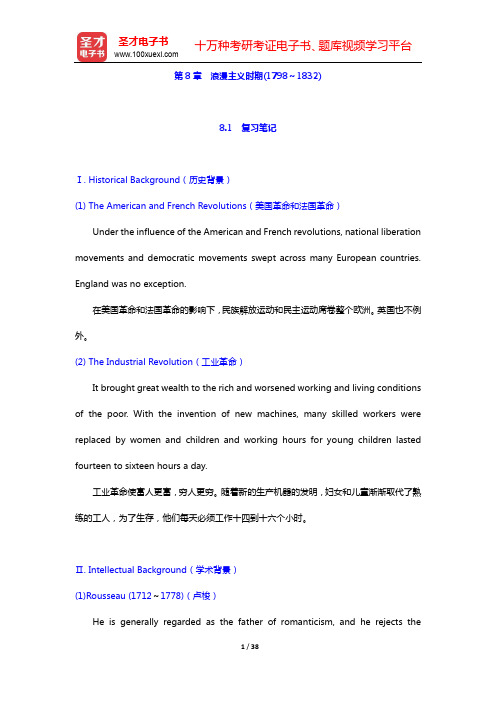
自由诗体
Ⅳ. Major Poets(主要诗人) 1. William Wordsworth (1770~1850)(威廉·华兹华斯) (1) His Life(生平)
Wordsworth was born and grew up near the Lake District, a beautiful scenic spot in northwestern England. From his very early years, he had a profound love for nature, which characterizes all his works. In 1843 after the death of Southey he was made poet laureate.
ห้องสมุดไป่ตู้
圣才电子书
主观性
十万种考研考证电子书、题库视频学习平台
(2) Spontaneity
自然性
(3) Singularity
独特性
(4) Worship of nature
崇拜自然
(5) Simplicity
简洁性
(6) Melancholy
忧郁性
(7) Free Verse
卢梭是浪漫主义之父,他反对崇拜理性,他认为对待生活中很多至关重要的问题最好是 靠感觉、直觉、情感,。他倡导文明人“回归自然”,回到生命最原始的状态中去。 (2) Edmund Burke (1729~1797)(埃德蒙·伯克)
As a political philosopher he is known for his Reflection on the Revolution in France (1790), in which he repudiates the revolution, claiming that no one has the right to destroy the institutions and traditions that have been passed down to him through generations and to destroy them is to destroy civilization itself.
罗经国新编英国文学选读第4版笔记和考研真题详解
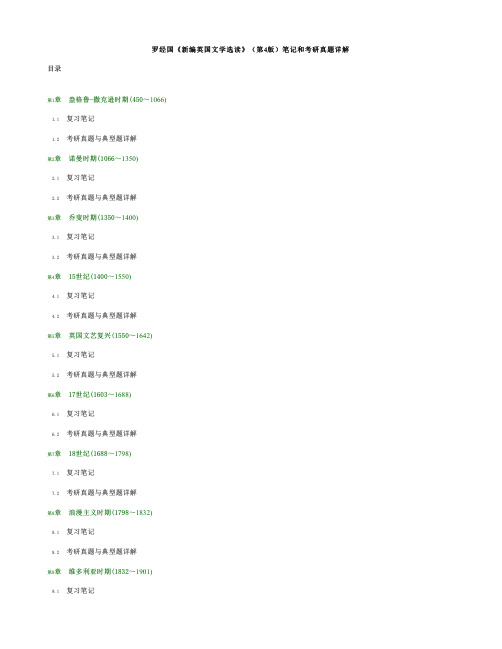
罗经国《新编英国文学选读》(第4版)笔记和考研真题详解目录第1章 盎格鲁-撒克逊时期(450~1066) 1.1 复习笔记 1.2 考研真题与典型题详解第2章 诺曼时期(1066~1350) 2.1 复习笔记 2.2 考研真题与典型题详解第3章 乔叟时期(1350~1400) 3.1 复习笔记 3.2 考研真题与典型题详解第4章 15世纪(1400~1550) 4.1 复习笔记 4.2 考研真题与典型题详解第5章 英国文艺复兴(1550~1642) 5.1 复习笔记 5.2 考研真题与典型题详解第6章 17世纪(1603~1688) 6.1 复习笔记 6.2 考研真题与典型题详解第7章 18世纪(1688~1798) 7.1 复习笔记 7.2 考研真题与典型题详解第8章 浪漫主义时期(1798~1832) 8.1 复习笔记 8.2 考研真题与典型题详解第9章 维多利亚时期(1832~1901) 9.1 复习笔记 9.2 考研真题与典型题详解第10章 20世纪 10.1 复习笔记 10.2 考研真题与典型题详解弘博学习网————各类考试资料全收录内容简介《新编英国文学选读》(第4版)(罗经国主编)一直被用作高等院校英语专业英国文学教材,被许多院校指定为英语专业考研必读书和学术研究参考书。
作为罗经国《新编英国文学选读》(第4版)教材的学习辅导书,本书遵循该教材的章目编排,共分10章,每章由两部分组成:第一部分为复习笔记(中英文对照),总结本章的重点难点;第二部分是考研真题与典型题详解,精选名校经典考研真题及相关习题,并提供了详细的参考答案。
本书具有以下几个方面的特点:1.梳理章节脉络,浓缩内容精华。
每章的复习笔记以该教材为主并结合其他教材对本章的重难点知识进行了整理,并参考了国内名校名师讲授该教材的课堂笔记,因此,本书的内容几乎浓缩了经典教材的知识精华。
2.中英双语对照,凸显难点要点。
本书章节笔记采用了中英文对照的形式,强化对重要难点知识的理解和运用。
- 1、下载文档前请自行甄别文档内容的完整性,平台不提供额外的编辑、内容补充、找答案等附加服务。
- 2、"仅部分预览"的文档,不可在线预览部分如存在完整性等问题,可反馈申请退款(可完整预览的文档不适用该条件!)。
- 3、如文档侵犯您的权益,请联系客服反馈,我们会尽快为您处理(人工客服工作时间:9:00-18:30)。
第7章18世纪(1688~1798)7.1 复习笔记Ⅰ. Historical background(历史背景)With the ascent of the bourgeoisie cultural life,some special features are worthy of our notice:随着市民阶层文化生活的提升,以下几点值得我们的注意:(1) Political writings(政治写作)The rise of the political parties and their rivalry called forth writers,literary men willing to work for either party in order to help either of them win more votes.政党的崛起,他们的竞争对手召集作家进行创作,而作家们一般都愿意帮助其中任何一派来替他们拉选票。
(2) Newspapers and journals(报纸和期刊)With the coming of the 18th century a new mass media came into being. Both parties printed newspapers as a means to express their views. Besides, the rise of the middle class also helped the growth of the newspapers.随着18世纪的到来,一种新的媒介开始形成。
双方政党都印刷报纸作为宣传他们主张的媒介。
此外,正在上升的中产阶级也推动了报业的发展。
(3) Coffeehouses(咖啡屋)In the latter half of the 17th century and throughout the 18th century, the coffeehouses in London served as informal meeting houses for men of all classes,where they could exchange their opinions and do business.17世纪后半叶和整个18世纪,伦敦的咖啡屋都被当成是各个阶级的非正式会议室,他们可以在那儿交流意见、业务往来。
(4) The new morality(新道德)The balance of power, in spite of the fact that the Whigs held sway for forty years, was so even that it was an age of moderation, tolerance, and common sense. This was to a great extent due to the development of science and philosophy of the time.权力制衡,尽管辉格党的政权40年来飘摇不定,但这仍旧是一个温和的,宽容的、合情合理的社会。
这归功于当时科学和哲学的发展。
(5) Science and technology(科学技术)In order to understand why reason came to be predominant in the 18th century, it is important to know something about Newton’s scientific discovery and the philosophy of John Locke.为什么18世纪是理性主宰的世纪?我们有必要知道一些牛顿的科学发现和约翰·洛克的哲学。
(6) The French influence(法国的影响)Classicism as a trend first originated in France when France was the leading power of the western world. They propounded that dramatists should follow the rules set down by Roman writers. They believed that those Roman writers had established the perfect art and rules of art for future generations to follow. Those rules could best be learned from close study of their works and by careful imitationof them.古典主义潮流始于法国(路易十四统治时期),当时法国是西方世界的主导力量。
他们提出剧作家应该遵循古罗马作家的写作规则。
他们认为古罗马作家已经建立起了完美的艺术和艺术规则,并且为后世的创作提供了标准。
最好要通过细致地研究他们的作品和仔细地模仿学习来学习这些规则。
Ⅱ. The Characteristics of Neo-classicism(新古典主义的特点)(1) emphasis on reason rather than emotion重视理性而非主观情感(2) didactic and satirical说教和讽刺意味(3) closed couplet the only possible verse form联句是唯一可能的形式(4) catering to the interests of the “society” in great cities迎合大城市“社交界”的兴趣(5) totally different from romanticism与浪漫主义截然不同Ⅲ. Main Writers(主要作家)(1) Daniel Defoe (1661~1731)(丹尼尔·笛福)①His Life(生平简介)Daniel Defoe was born in a lower middle class family. His father was a butcherand a staunch Puritan in religion, a dissenter against the Church of England. And because of this, Defoe was deprived of the opportunity to go to college. He attended a school specially set up for dissenting children. Later, he educated himself by reading widely and traveling both in England and on the Continent.笛福出生在中下阶级家庭,父亲是肉贩,是坚定的清教徒,反对英国国教。
由于此,笛福被剥夺了上大学的权利。
他在专门为反对国教者的孩子们设立的学校读书。
后来,他通过广泛阅读和周游英国与欧洲大陆而自学。
②Major Works(主要作品)Captain Singleton《辛格顿船长》A Journal of the Plague Year《大疫年纪事》Moll Flanders《摩尔·弗兰德斯》Roxana《罗克珊娜》Robinson Crusoe《鲁滨逊漂流记》③Appreciation of Works(作品赏析)◆Robinson Crusoe《鲁滨逊漂流记》a. The plot of the story(主要情节)Robinson Crusoe, son of a well-off family, chose to go overseas to seek fortune, instead of staying at home to inherit his father’s wealth and property. During his many dangerous adventures abroad, he gradually accumulated money and owned a plantation in Brazil. But, he still would not stop seeking new adventures and more wealth. And finally, on one of his journeys of the slave trade a shipwreck landed him on a desolate island where he stayed for 28 years 2 months and 19 days. Using the ammunition and provisions he found on the wrecked ship, Crusoe fished and hunted, made clothes out of animal furs, built a house like a stronghold, learned to raise goats and grow crops, and even saved a savage, named him Friday and trained him to be his servant. At the time of his return to England, he had built on this island a new colony.鲁滨逊生活在富裕的家庭,他选择到海外寻求财富,而不是待在家继承父亲的财产。
在充满危险的海外探险过程中,他积累了财富,并在西班牙拥有一个种植园。
但是,他没有停止对新冒险和财富的寻找。
最终,在一次黑奴交易中,船只失事了。
他被滞留在孤岛上长达二十八年零两个月十九天。
他利用在沉船上找到的弹药和供应品进行钓鱼和打猎,用动物皮毛制作衣服,建造了一座堡垒似的房子,学习饲养羊,种植农作物,甚至救了一个奴隶,把他叫做“星期五”并把他训练成仆人。
当他要回英国时,他已经在这座岛上建立了一个新的殖民地。
b. The theme of the story(主题)Daniel Defoe portrayed Robinson Crusoe as a real representative of the empire builders in the bourgeoisie revolution. He is the most practical and exact, always religious and at the same time mindful of his own profit.丹尼尔·笛福将鲁滨逊塑造成为了一个英国资产阶级革命运动中的典型的帝国建造者。
